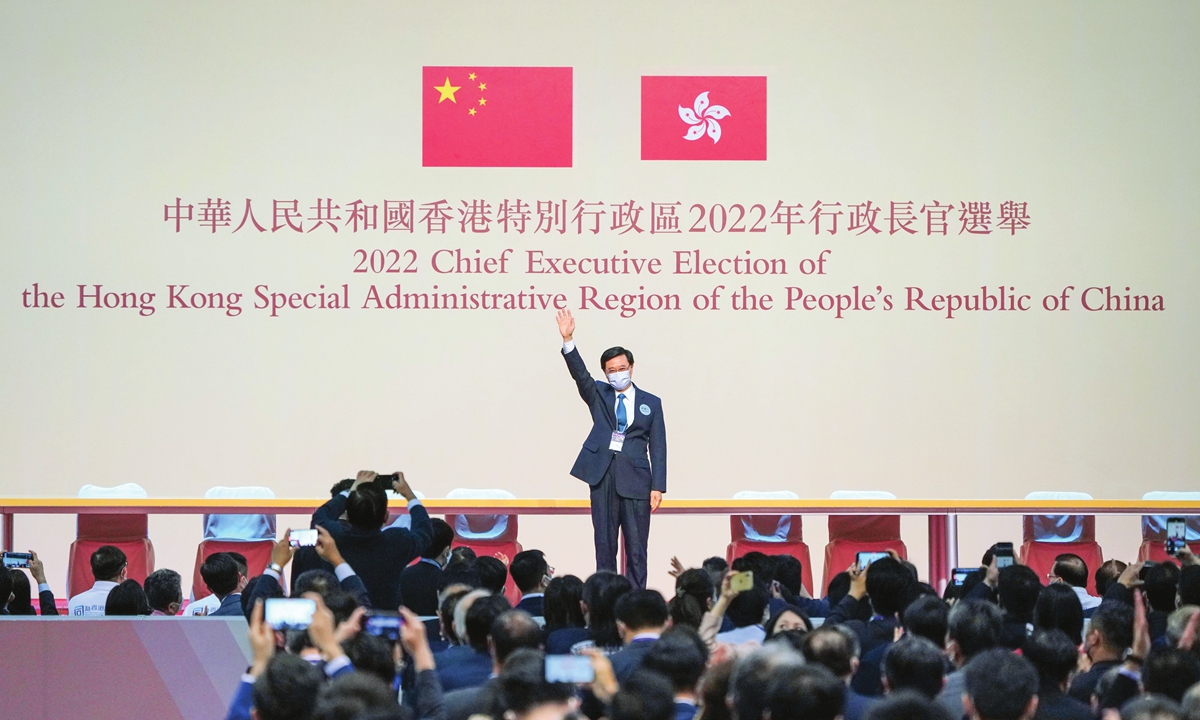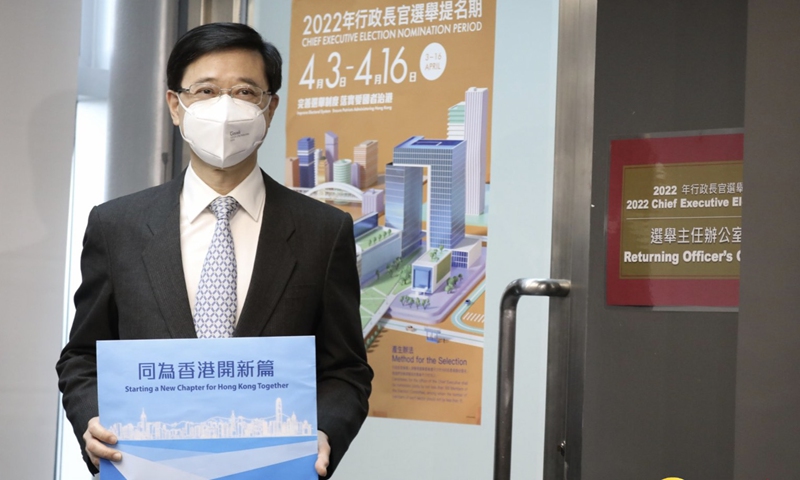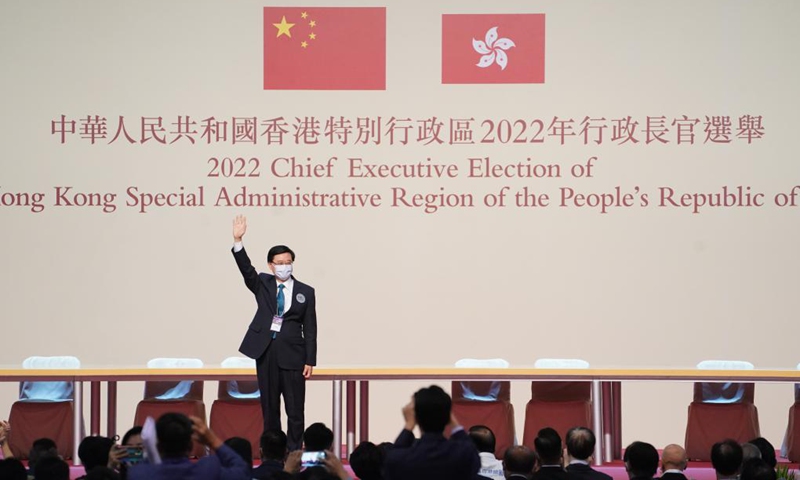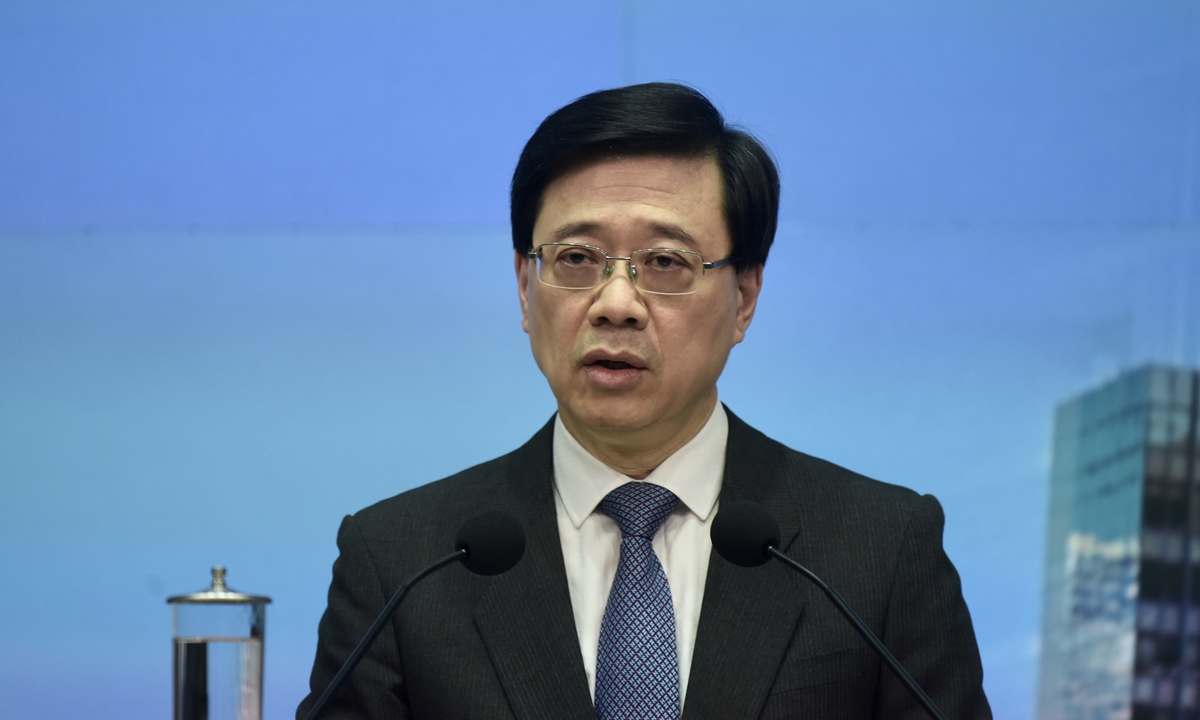
John Lee waves to people after winning the election of the sixth-term chief executive of the Hong Kong Special Administrative Region on May 8, 2022. Photo: cnsphoto
The election was the first for Chief Executive since the implementation of the national security law for Hong Kong and the electoral reforms brought about the principle of only patriots administering Hong Kong. The conclusion of the election also signaled that all the elections under the new electoral system have been completed and it's time for the new local governing structure following the principle to be tested by the country, Hong Kong people and the international community, experts said.
On Sunday morning, 1,428 Election Committee (EC) members cast their "support" or "not support" votes, with an overall turnout of 97.74 percent, while 33 members did not vote. Lee secured 1,416 supporting votes among the 1,428 EC members who voted, or 99.16 percent of the votes cast.
The overall process was described as smooth and well-organized by some EC members. With such a high level support, some members and experts considered Lee to be the ideal person for the job, who will help the new government gain more public support, and fight back foreign hostile forces that try to interfere in Hong Kong affairs.
"Such wide and sincere support for Lee has laid a good foundation for the new government, which will help him to form a new governing team and roll out measures to tackle issues such as epidemic control, economic recovery and social livelihoods," Lau Siu-kai, vice-president of the Chinese Association of Hong Kong and Macao Studies, who is also a senior government advisor, told the Global Times on Sunday.
Shortly after Lee was announced to have been elected as the Chief Executive for the HKSAR government, he stepped onto the stage and delivered a quick victory speech, bowing to the public and EC members to express gratitude for their support.
Lee vowed to safeguard the city's constitutional order and the Basic Law, being responsible to the central government and to Hong Kong society, safeguarding the country's sovereignty, national security and development interests.
As Lee had gained 786 nominations from EC members, it was no surprise that he won the highest level of support in the history of the CE elections, experts said. "As Lee is supported and trusted by the central government, most EC members voting for him actually unified around the central government, which will help enhance the central government's leadership among patriots in Hong Kong," Lau said.
New challenges
Both the Hong Kong and Macao Affairs Office of the State Council and the central government's liaison office in Hong Kong sent congratulatory messages to Lee on his major victory, praising the orderliness of the election and expressed their expectations of the new leader, who rose from a frontline police inspector to chief secretary, showcasing his rich experience and strong capabilities.
The next five years will be the period for Hong Kong to emerge from social turmoil to being well-governed and to develop, and we believe that if the new government and representatives from various sectors seize the historical opportunities, it will be a new starting point for Hong Kong to create a splendid history, said the State Council's Hong Kong and Macao Affairs Office.
The liaison office said the election fully underscored the principle of only patriots governing Hong Kong and the advantages of the new election system, which is another successful practice of democracy with Hong Kong characteristics.
The Democratic Alliance for the Betterment and Progress of Hong Kong, the city's largest pro-establishment camp, said in a statement sent to the Global Times on Sunday that it hopes Lee will invite those with capabilities, vision and a shared mindset to join the governing team. It's also expected that Lee and his team will enhance ties between officials and lawmakers, and to fully listen to public opinion in formulating policies.
The new CE will face an unprecedented, complex and increasingly hostile external environment and challenging internal environment. As geopolitical wrestling between the US and China becomes more intense, it is difficult for Hong Kong to continue serve as a bridge between China and the West, Lau said, noting that potential Western sanctions, the impact of the epidemic and internal political friction all weigh on the future of the city.
"Those challenges also pose new requirements for the executive capabilities of the new CE," he said.
Lee's five-year term will start from July 1. As less than two months are left for him to form a new governing team, selecting people with capabilities, passion and endeavor is also seen as one of his urgent tasks. Lau said there will be no "honeymoon period" for Lee as he needs to take action to deal with those major issues of concern.
Urgent tasks
Besides forming a capable team for the next government, fixing the region's housing woes and implementing Article 23 were also among the urgent tasks listed by Lee when asked by reporters on Sunday. As he prepares to form an action team to deal with housing supply, the team is required to propose the first working report and suggestions within three months of taking up its position.
"We don't lack talents, I believe under the principle of only patriots administering Hong Kong, there will be many people who have passion and who will devote themselves to serving Hong Kong," Lee said.
Sunday's election completed the final step of the electoral system reform, after electing EC members, Legislative Council members and now CE. It is a fresh starting point for Hong Kong in terms of local governance by eliminating interference from anti-China and rioting forces in the system, Tian Feilong, an associate professor at Beijing-based Beihang University's law faculty, told the Global Times on Sunday.
"After all, we need to observe and supervise whether the new governing team will really serve Hong Kong society, coordinate with the country's development and enhance the city's competitiveness," Tian said.
Some Western media outlets like the New York Times have cast doubt over the legitimacy of the election, saying it's a "rubber-stamp", and some also raised questions over the "sole candidate", Tian said being the sole candidate only showed that Lee enjoys high expectations.
"Other people like Sin Kwok-lam showed his intention of running in the election but failed to collect enough nominations. The new electoral system is open to all the eligible candidates, but there was only one candidate left, and this was also the result of democracy," Tian said.
In response to some foreign politicians who slandered the electoral system and election, the Commissioner's Office of the Foreign Ministry in Hong Kong expressed firm opposition, urging them to stop interfering in China's internal affairs.
Some believe that Lee would be a hardline CE given his background and experience in handling the social turmoil in 2019. Lee has slammed the US sanctions and foreign interference, reiterating that the bottom-line mindset should be upheld in fighting internal and external risks. Although the overall situation in Hong Kong is now stable, there are hidden forces that could sabotage the stability, he said on Sunday.
Faced with all these challenges, the new government has to abandon the "non-intervention" or "big market, small government" mindset and enhance executive capabilities by streamlining administrative procedures and reforming outdated rules and laws, Lau noted.
"Only when they achieve their goals and make things happen can they win the hearts of the Hong Kong people and the central government," he said.




